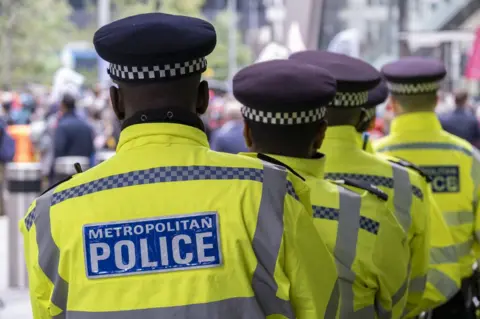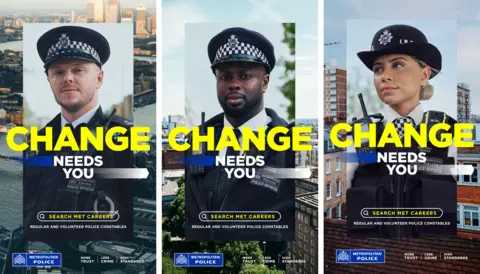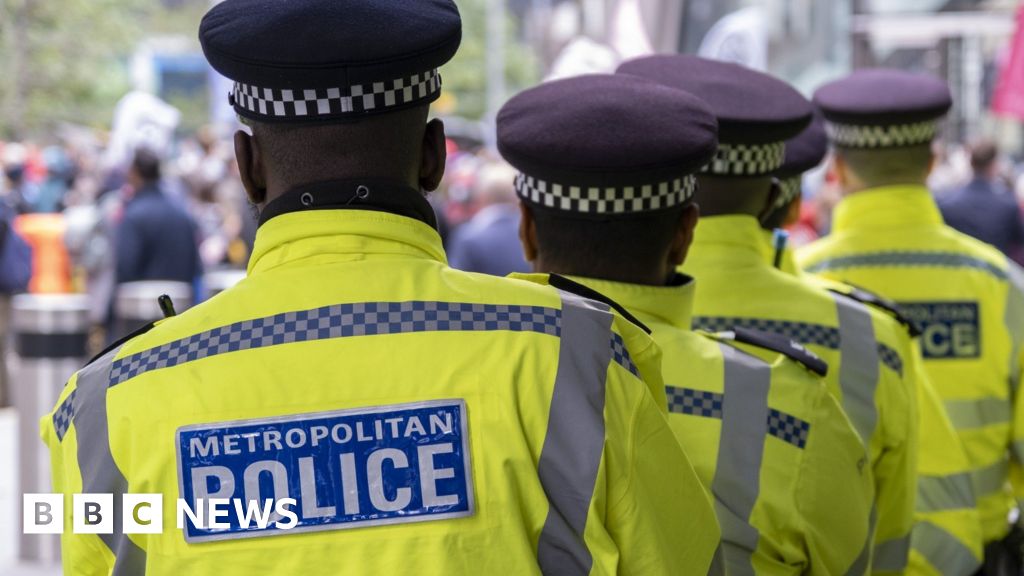 Getty Images
Getty ImagesA black Metropolitan Police officer has described being treated like “an animal” by some of his white colleagues and accused the force of handing down “pathetic punishments” to those who have made racist comments.
He is one of 10 black and ethnic minority officers who told the BBC that racism is getting worse in Britain’s largest police force.
“They keep putting you down, putting you down until you break and you feel nothing, no confidence, nothing,” he said.
Assistant Commissioner Pippa Mills, who is the Met’s lead on trust and legitimacy, told the BBC she was “incredibly sorry to hear those accounts from those officers”, adding: “It’s really difficult to hear.”
And in a statement, a Met spokesperson said: “We are deeply concerned to hear these accounts and we are so sorry that there are people in the Met who feel this way about working here.
“It is completely unacceptable and whatever progress we think we have made, it is simply not enough.”
‘They were laughing’
Speaking to BBC News, the officer – who we will refer to as Officer A – said: “You make fun of a black person’s hair and you’re sent on what they call ‘learning through reflection’, which is where you talk through the incident and they tell you what you should have done.
“It’s not exactly a harsh penalty for racist comments and doesn’t send a ‘no tolerance’ message.”
“I was asked if I had onions for dinner last night,” one South Asian officer said. “They were laughing, implying I smell of curry. They just make it so hard for us.”
Another officer said they got “funny looks because of my appearance”.
Over several weeks, the middle-ranking officers have given lengthy interviews about their experiences of working in the Met.
They described a culture where racism is swept under the carpet and where careers of black and ethnic minority officers are blocked.
All of the officers accused Met Commissioner Sir Mark Rowley of not doing enough to eliminate discrimination.
He said that 25% of recruits into the force were from ethnic minorities and progress on diversity issues was being made.
But a second South Asian officer said: “It’s [racism] got worse because there have been no concrete steps to tackle it, so now it’s swept under the carpet, with minority officers unfairly targeted over performance issues and covert racism is more rampant in the force.”
In 2019, the National Police Chiefs’ Council (NPCC) found ethnic minority officers were twice as likely as their white counterparts to be subject to misconduct allegations.
There are no statistics on how many black and minority ethnic officers are currently facing disciplinary action.
The Met has recently launched a recruitment campaign to boost falling numbers. The force has lost 5,000 officers in a decade and is currently short of 1,400 policemen and women.
According to their own figures, two out of every 28 officers at the most senior ranks – commander and above – are from an ethnic minority.
 Metropolitan Police
Metropolitan PoliceAn advert for the new campaign states “change needs you” and pictures some ethnic minority police.
Officer A said: “The new recruitment is a joke. If people want to know what discrimination feels like, then you need to join the Met.
“Then you’ll know what discrimination feels like… It’s an absolutely disgusting organisation to work for.”
He said he would advise minority groups against joining the force.
‘When you talk nobody listens’
“They’re never going to call you a [deeply offensive racial insult] but they’ll treat you like an animal.
“If they get a whiff that you’re looking to progress they’ll find a way of blocking that from happening.”
Officer A added: “You get talked over or you’re the last person to be asked for your views or feedback, and then when you talk nobody listens.
“This is the sort of stuff that affects your confidence.”
Another officer added: “The change needs to happen within and from the management board down.”
Officer A said things had got worse since the Casey report publication, saying “we can’t talk about racism without them squirming and seeing us as the problem.”
“The commissioner doesn’t accept racism as an issue and that it’s as bad as it is – and some just carry on behaving badly without being called out.”
In 2020, the NPCC announced a national race action plan in England and Wales to deal with discrimination, in the wake of the US murder of George Floyd by a serving police officer.
It is led by Deputy Assistant Commissioner Dr Alison Heydari from the Met.
Assistant Commissioner Mills said: “We’re really proud that she’s leading [it]… The fact that we support the national police race action plan with the most senior black female in policing nationally, I think that’s a really significant commitment.”
‘Toxic environment’
Just weeks ago, the National Black Police Association (NBPA) withdrew its support from the plan, saying policing was not a safe occupation for black and Asian officers.
Andy George, president of the NBPA, said: “We believe that the working environment is toxic and the experiences and views of black and Asian people and civil society organisations are neither listened to nor valued. This is not an environment that the NBPA can endorse or be a part of.”
He said the Met had enabled people to work on the national race action plan, but had provided little resources for its own, local race action plan.
“We believe that this course of action is a deliberate attempt to control the activities within the national race action plan so that the MPS is not forced into making improvements in London.”
Officer A added: “Nothing has changed at the Met. You’d think they’d be talking about it, they were changing it, but there are no posters or anything on the intranet.
“Nothing about the London race action plan. It’s just lip service.”
A Met spokesperson said the force was “determined to deliver genuine change” to become a more inclusive organisation.
They said progress was being made, but it would take time for staff to feel the impact.
“It is only when that happens that we will begin to rebuild the trust and confidence of these officers whose experiences of the Met have fallen so far short of what they have a right to expect.”
Assistant Commissioner Mills added that the Met was looking at vetting processes of existing and new staff to “make sure we’re getting rid of those people who don’t uphold our high standards and values”.

